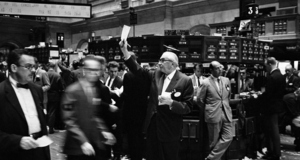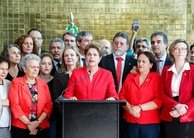From Cornell International Affairs Review VOL. 2 NO. 2In Praise of Populism: The Coming Reconstruction of Financial Regulation
IN THIS ARTICLE
KEYWORDS
Newspaper and Television commentaries in the United States and Europe abound with references to "outbursts of populism" in United States as a stereotypically American response to economic crisis.1 Their story lines trivialize historic Populism in the U.S., both its substance and its contribution to financial regulation. American Agrarian movements arose in response to grievances rooted in pathologies of mature, weakly regulated capitalism. The agrarians had real grievances linked to rigidities of the gold standard and bank control of note issue, monopoly control of longdistance transportation and crop storage, the use of the growing power of large firms to repress labor, and a rising cost of living due to growing monopolization and high tariffs. Most of the policy solutions demanded by late 19th century populism and its progressive era legatees were enacted in some form in the two spurts of regulation during the early 20th century (the progressive era and New Deal). There are indeed some commonalities between public criticism of capitalist greed in those periods and the present; but scorn for "populist outbursts" against the risks taken by greedy financiers who made billions while bringing financial ruin to the global economy distracts our attention from the destructive folly of those financial actors, and presumes that public outrage is unjustified and counter-productive. In fact, it is neither. That such a small number of actors could wreck such havoc on the world is surely a cause for outrage among reasonable people around the globe. Recognition of error is essential for human learning and the evolution of institutions. It would be quite peculiar, and disturbing, if there were no wave of criticism in the face of such unethical and damaging conduct. No American reform surge has occurred in absence of such public outrage. It was public offense over corporate malfeasance that gave us the 1887 Interstate Commerce Act, the 1890 Sherman Antitrust Act, the 1894 income tax law (and the 1913 Constitutional amendment needed to overcome Supreme Court objections), the 1913 Federal Reserve Act, the Child Labor Acts, the 1933-34 laws taking the dollar off gold, the 1934 Reciprocal Trade Agreements Act (which moved the nation away from the protectionist disaster of the Hawley-Smoot Tariff and toward trade expansion), the 1933 and 1934 Securities Acts, the 1933 Glass-Steagall Banking Act, the creation of the Federal Deposit Insurance Corporation in 1933, the 1938 Fair Labor Standards Act, and many other laws that served this country, and the world economic system quite well for many decades. The troubles the United States and the rest of the world are now experiencing are the consequence of the repeal or lax enforcement of much of that "populist" legislation, or (in the case of the more exotic financial instruments now gone toxic) the deliberate policy choice NOT to regulate those new products, while United States policy makers were firmly in the grip of the neoliberal ideology that triumphed in American politics in 1980.2 At the opposite pole from "populist outrage, " Americans were lulled into quiescence in the Clinton years by the public officials and expert economists who assured them that these esoteric instruments, and continuing deregulation of finance and securitization, would lead to indefinitely expanding prosperity. Now that the United States has once again learned the painful lessons that the 1930s generation learned, and on the basis of which, with expressions of outrage from the president on down, the U.S. then constructed a well regulated financial system that was a wonder of the democratic world, a resurgence of the "populist outrage" that led to that legislation is both normal and useful to the current reform effort. And so long as Congress and the president appear to be seriously working on the construction of a new edifice of regulation to prevent future crises of this magnitude, American outrage will likely be more restrained than that of the French and British protests. One of the misconceptions of journalists engaged in commentary about "populist outrage" is that historical American Populism of the late 19th century was intolerant and focused on scapegoats. Nothing could be farther from the truth. The Farmers' Alliance was, for its time, remarkably inclusive in forging an alliance of white and black farmers, supporting black suffrage (and women's suffrage, as well), endorsing the demands of the labor movement, and promoting political and economic equality within a capitalist democracy. They were confident that antitrust laws, regulation of large firms, more rights for labor, and a publicly controlled national currency not tied to gold alone and expanding to keep pace with commerce and population growth would expand the nation's prosperity. And they were right, though regulatory learning and adaptation took place in the rough and non-linear fashion that is characteristic of all human experimentation with institutional rules. Franklin Delano Roosevelt's progressive cabinet, which was responsible in part for the financial regulations of the early 1930's. As the G-20 countries press the United States to reform the (de-)regulatory system that permitted the financial practices that brought down the global economy, it is well to give the Populists (and Progressives, and New Dealers) their due, and to cast a curious eye on earlier institutional learning. The Past as PreludeIf there is to be a new surge of regulation, a "new New Deal" as it were, what might be the contours of the new system, and the pattern of politics that produces it? On the basis of past episodes of severe recession and regulatory creativity, and with governmental separation of powers and the two-party system held constant, the following predictions can be made: (1) The United States will construct its new financial regulatory system as a national effort, despite the president's endorsement of the need for international coordination of financial rules at the G-20 meetings; (2) even though Treasury Secretary Timothy Geithner has struck first with a rough template for a new system of national financial rules,3 Congress will have as much, or more, to say about its shape; (3) the legislative recommendations will be embodied in more specific and punitive bills (the House version more restrictive than the Senate bill) than proposals by the executive branch; and (4) party and region (which overlap significantly) will channel "populist rage" in very different ways. But such an intensely national regulatory process, and the American president's refusal to promise any real enforcement power to the new international Financial Stability Board conceived at the G-20 meeting4 need not distress the European and other officials so unhappy at what lax U.S. regulation has done to the world economy. If there is indeed a new surge of American financial populism, it might provide the tough rules the international community demands for American firms, and even a model to which others might subscribe. Regulatory NationalismIn the early summer of 1933, Britain and Europe waited anxiously for the president's emissary, Raymond Moley, to arrive by ship for an international conference to coordinate western responses to the depression, especially monetary strategies. They were severely disappointed. Franklin Roosevelt had been battered by domestic populists into taking the U.S. off the gold standard and allowing the dollar to fall precipitously in its relation to the pound, a boon to commodity prices and U.S. exports. The president would not agree to stabilize the dollar in a narrow range around $4/pound sterling, as the British demanded. Roosevelt's sole concern was the domestic economy and congressional pressure to take far more drastic action than his own Tory temperament could allow.5 As the World Monetary and Economic Conference in London began, the dollar had slid to $4.43/ pound, despite the desperate protestations of Roosevelt's international financial advisor, Paul Warburg, and his Budget Director Lewis Douglas, who famously described going off gold as "the end of western civilization."6 For Roosevelt, it was necessary to reflate the domestic economy and subdue the congressional agrarians. While the Europeans pressed for monetary stabilization, the goal of the conference in the president's mind was to preserve "his freedom to act on the domestic scene" and "to raise the [commodity] price level." The international conference should thus "go along and work in our New Deal direction ‘of debtor relief, price raising, and the increase of purchasing power if there was to be anything' to cooperate about."7 The G-20 meeting of April 1-2, 2009, ended much more amicably and optimistically, with verbal agreement on cooperation for extensive reconstruction of financial regulation, as well as an expansion of credit through the IMF, aid to poor countries, and a pledge to resist trade protection. President Obama is much more attuned to global responsibilities than the pre-war Franklin Roosevelt (or G.W. Bush throughout his administration). However, it is success in domestic policy that assures reelection, and diplomacy thrives mostly in the last two years of an eight-year presidency. International coordination thus cedes priority in the early years of an administration to immediate political needs. And the United States is not alone in putting national interests above international demands, in the 1930s or 2000s.8 Of course, there is greater interest in Europe than in the U.S. for establishing some degree of international control of financial practices, as the only way to reign in an American system gone mad. The U.S. failure to regulate its financial products infected the rest of the world, and if the U.S. is not willing to regulate itself, others will attempt to establish supranational regulatory authority.9 Institutional Competition over Economic RegulationBut inaction on the part of the United States is extremely unlikely. Though Secretary Geithner has made very general recent proposals for restoring and modernizing national financial regulation, the president has observed that he expects Congress to be deeply involved. Indeed, that has always been the case. At the beginning of national business regulation in the late 1880s, Congress took the lead and the president was almost invisible. In the next two regulatory surges, the president was much more involved, but Congress, always mindful of its Constitutional duty to regulate interstate commerce, and far closer than the president to the economic distress of less advantaged constituents, was a strong contender in the shaping of regulatory law. In many cases of Progressive Era and New Deal regulation—for example, in railroad, antitrust, labor, commodity futures, trade practices, deposit insurance, the separation of investment from commercial banking, and the establishment of federal regulation over securities trading, Congress took the lead and the president struggled to influence the legislative process.10 By the time President Wilson took office in 1913, Congress was already at work on creation of a federal banking system (the Federal Reserve); by Roosevelt's inauguration in 1933, congressional Democrats were enmeshed in drafting bills for federal deposit insurance (despite the President's opposition),11 and made the United States the first country to enact such a system, decades ahead of other democracies. Congress—acting through the typical Progressive and New Deal era reform coalitions of agrarian Democrats and Midwestern progressive Republicans-had attempted to regulate securities trading in 1914, but President Wilson's opposition delayed such government supervision until 1933;12 the House had, by that point, been investigating securities trading and the need for federal control of the stock exchanges for almost a year under the guidance of committee counsel, Ferdinand Pecora. In 2006, as in 1930, Democratic victories in congressional elections preceded the election of a Democratic president and that, along with its active institutional tradition in interstate commerce regulation, gave the legislature a head start on new legislation. There is no reason to think this institutional activism has faded. The fact that Congress has taken its time with investigations of "what went wrong" and given priority to stimulus packages and alleviation of immediate distress through attention to the housing mortgage crisis, small business credit ,and credit card debt alleviation13 should not be interpreted as an indication of legislative disinterest in permanent legal remedies to prevent recurrence of the exposed financial wrongdoing. The House of Representatives usually takes the lead on regulatory law, by virtue of being closer to its (generally) smaller constituencies, and standing for more frequent election, as well as the Constitutional requirement that tax legislation begin in the House. Further, House members serve on fewer major committees, and thus specialize to a greater extent than Senators. A broad generalization, aided by the fact that Senators were only popularly elected after 1913, overrepresent small and conservative states west of the Mississippi, and usually have much more expensive campaigns to fund than Representatives, is that regulatory legislation in the House will be stricter than in the Senate. It is thus Representative Barney Frank of Massachusetts, Chair of the House Financial Services Committee, who will play the lead role in producing new financial regulation, in a committee with a history of populist regulatory tendencies.14 And Frank himself might be described as a modern day Populist, never enthusiastic about deregulation, close to organized labor, sympathetic to debtors, and less dependent on the finance industry for campaign contributions than the President, his Chief of Staff, or the finance industry's favorite beneficiary, Senator Chris Dodd of Connecticut, chair of the Senate Banking Committee.15 Frank is intent on rebuilding and modernizing financial regulation, particularly extending federal control over "Hedge funds, private equity funds, investment banks — anything that's not a bank" under existing regulations. His committee will also seek federal supervision over the securitization of financial products, and executive pay practices, the latter in order to remove perverse management incentives to take undue risk.16 These concerns line up closely with the regulatory goals of the G-20, particularly those of the strongest regulation advocates, Angela Merkel of Germany and Nicolas Sarkozy of France.17 The House committee's bill will no doubt get watered down in the more conservative Senate but the final congressional bill to regulate the finance industry may be expected to exceed in toughness and specificity the proposals of the executive branch, if history is a reliable guide.18 House populists, then, should be the natural allies of Europeans seeking stronger U.S. financial regulation. Party, Region, and Triangulating PresidentsPopulism, historically, emerged from the agricultural and mining regions of the South, Midwest, and Mountain states in the 1890s. A century later, in the midst of recession, an outburst of financial populism put a scare into bankers and the conservative Federal Reserve Board.19 In the difficult economy of the late 1970s and early 1980s, as well as the recession of the early 1990s, (the last episode of full-fledged populist challenge before the present era), some residue of the old populist era geopolitics was still present in the willingness of farm districts and states to challenge bankers (both private and central). But in congressional efforts to wring lower interest rates, more transparency, and democratic responsiveness from the Federal Reserve Board, agrarian regions were joined in the 1980s and early 1990s by Democratic Congress members from urban constituencies (mostly northern) that were experiencing relatively high unemployment and low median income. Though little came of the hundreds of Fed-curbing bills introduced in the House and Senate, the populist agitation was serious enough that President Clinton used it (in classic "good cop, bad cop" fashion) to pressure the Fed to loosen up on monetary policy. One might argue, then, that congressional populism was instrumental in persuading Fed Chair Alan Greenspan to ease off the brakes on money and credit creation—a development that was a major cause of the unprecedented economic growth of the Clinton years.20Continued on Next Page » Suggested Reading from Inquiries Journal
Inquiries Journal provides undergraduate and graduate students around the world a platform for the wide dissemination of academic work over a range of core disciplines. Representing the work of students from hundreds of institutions around the globe, Inquiries Journal's large database of academic articles is completely free. Learn more | Blog | Submit Latest in Economics |


















